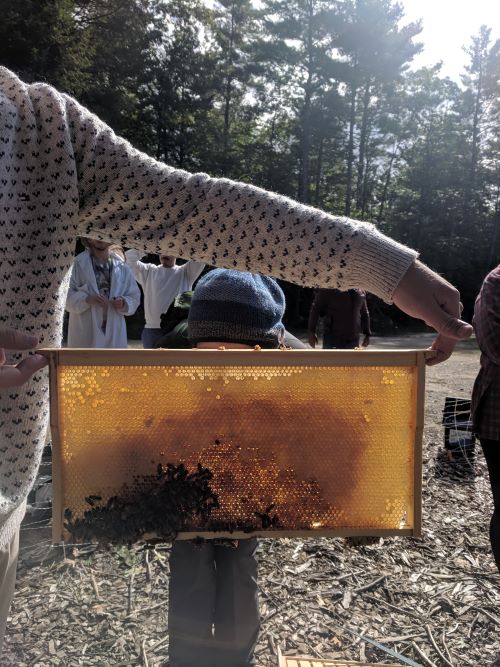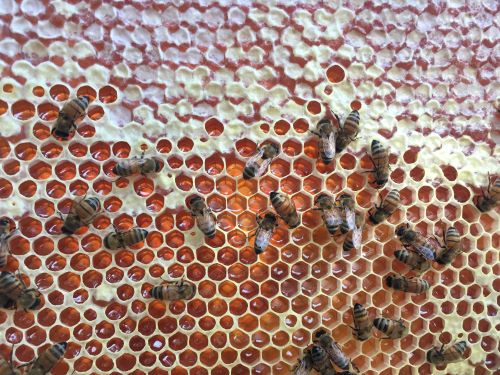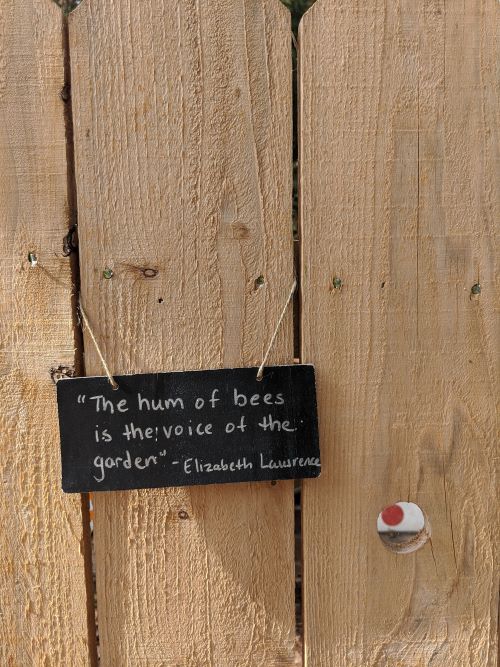Often times, one may not think of beekeeping as an urban activity. Myself, I have imagined beekeepers as people who reside in the country side, undisturbed by the everyday noise, pollution and concentration of human populations that define cities. My grandfather was a beekeeper for some time, settled in a quiet community outside of the mountainous city of Asheville, North Carolina. I remember learning about how to produce honey, how to check on the hives and mostly, how to love the process. His hives suffered after a cold winter, unfortunately, and he was never able to get back to his hobby.

Beekeeping came back to my life during a brief but magical time when I lived in Freedom, New Hampshire. My life here took place in a shared lakeside cabin, where I met 30 other strangers who soon came to feel like family. We were teaching outdoor environmental education to students who came from the city to live and learn on our campsite, for a week. One of the courses I taught, which was my favorite for a multitude of reasons, was beekeeping. Through the community of 6 hives, this was the most immersive experience I had with bees, with the added benefit of showing this unique world to young students.

Back to urban beekeeping, this has been something that has interested me lately, since moving to Brussels. I wondered if beekeeping in the city was a common activity, or if it was even possible. After a brief internet search, I found many sources that would confirm that indeed, urban beekeeping is a feasible and increasingly popular activity. (See this post by PerfectBee, on “The Growth and Feasibility of Urban Beekeeping”).
In Brussels particularly, many urban beekeepers are generating buzz about their activities and hive-based products. One beekeeper in particular, found in Uccle, is Vis Ma Vie d’Abeille. This honey making business offers its customers honey, pollen and fresh royl jelly products, straight from their hives. In addition to their products, the business shares knowledge about their products, the benefits of honey consumption, beekeepers, what distinguishes quality honey and how beekeeping is an acitvity that contributes to sustainable agriculture and the protection of biodiversity. Click on the links below to discover the articles.
- La tendance actuelle des cadeaux de naissance personnalisés (The current trend of personalized birth gifts)
- Profitez des bienfaits du Miel d’Eucalyptus (Enjoy the benefits of Eucalyptus Honey)
- Planifier le Ramadan 2023 (Plan Ramadan 2023)
- Le monde magique des abeilles (The magical world of bees)
- Miel et cristallisation (Honey and crystallisation)
Note: The articles are written in French. You can translate these via your browser with a Google Translate plug-in.
One article by Vis Ma Vie d’Abeille covers the world of beekeeping in Brussels. Honey in Brussels is known for its exceptional quality and unique flavour, as producers maintain high standards in production and processing. As referenced from this article, beekeeping is a growing activity throughout Belgium, with 9,071 beekeepers recorded in the year 2021. (See the post, “Discover Brussels honey” to learn more!).

Another Brussels-based urban beekeeping venture takes honey production to the next level, through rooftop beekeeping. BEES API BRUXELLES is installing his hives on the rooftops of Brussels and producing local, natural and high quality honey.

Meanwhile, a global company called Alvéole is installin beehives on rooftops of building throughout the world, including in Brussels. To get in contact with the company to discuss the opportunity of installing beehives on your rooftop in Brussels, click here!
There are many initiatives and beekeepers in Brussels and throughout Belgium that encourage the act of beekeeping. This includes research projects, such as the EU Bee Partnership Prototype Platform on Bee Health, and the initiative of Honeybee Valley, a research group which focuses on the declining bee population in the wild, through which a Ukrainian refugee has found the opportunity to become a beekeeper at Ghent University.
I have so much more to learn about beekeeping in Brussels, and beekeeping in general. At the moment, I have limited experience but a keen fascination on the subject, which I plan to explore. Seeing the inspiring work of beekeepers around me, excites me to continue in this direction and discover more about this world…